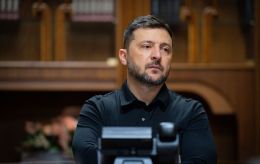'This war ends with defeated Russia,' Polish Charge d'Affaires in Ukraine Piotr Łukasiewicz
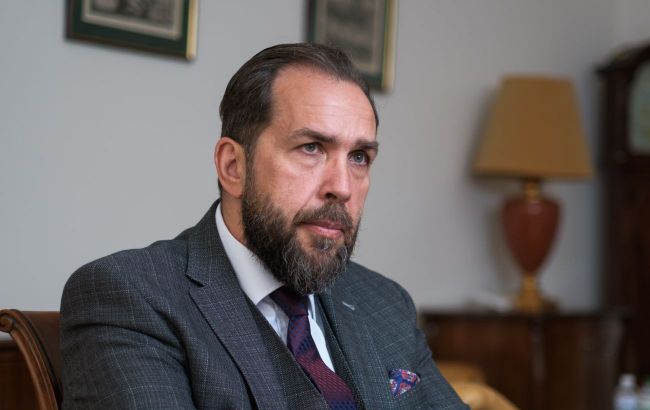 Charge d'Affaires of Poland in Ukraine Piotr Łukasiewicz (all photos: Vitalii Nosach / RBC-Ukraine)
Charge d'Affaires of Poland in Ukraine Piotr Łukasiewicz (all photos: Vitalii Nosach / RBC-Ukraine)
Piotr Łukasiewicz, Charge d'Affaires of Poland in Ukraine, discusses peace talks, Ukraine's movement towards the EU and NATO, bilateral relations with Poland, Ukrainian refugees, historical issues, trade disputes, and, of course, the Polish elections, in an interview with RBC-Ukraine.
Immediately after the start of the full-scale Russian invasion, Poland proved to be Ukraine's best friend among all its neighbors. Its leadership, unlike many in the West, did not persuade Ukrainians to surrender and believed that Russia could be stopped. It was to Poland that the main flow of Ukrainian refugees went, and many of them remain there to this day.
However, as the Russian-Ukrainian war became more commonplace, some problems began to emerge. The attitude toward Ukrainians in Poland is far from as favorable as it was at the beginning of Russia's full-scale invasion of Ukraine. The eternal topic of the Polish-Ukrainian confrontation of the 1940s began to be mentioned again.
An obvious factor in the aggravation was the fact that Poland went through several tense, extremely competitive elections during this period. The first round of the presidential campaign ended yesterday, May 18, and in two weeks, it will be finally determined who will become president of the key neighboring country of Ukraine.
"I'm not wandering around the corridors of the embassy thinking of the elections and their outcome," says Łukasiewicz, the Polish charge d'affaires in Ukraine, when asked directly whether anything will change for Ukraine after the elections. According to him, the two countries now have excellent diplomatic relations. Moreover, Łukasiewicz emphasizes that protecting Ukraine from Russian aggression is a national interest of Poland itself, and it does not depend on the election vicissitudes.
— A lot is going on in different negotiation processes these days. So, in light of all the recent developments, in your opinion, has the end of the war in Ukraine become any closer, are we moving toward it, or are we rather going in circles?
— I believe right now there are a lot of moving elements in this process. So it's really difficult to assess whether the peace is closer at the moment.
What we know for sure is that Ukraine will emerge victorious from this war. That is my general position, my general observation, and my general – very strong – belief that Ukraine will prevail and will be victorious in this war. And peace will be achieved on Ukraine's part from the position of strength as Ukraine itself, but also from the position of the strong alliance that supports Ukraine and that includes the European Union, European allies of Ukraine including Poland and the United States, and generally, broadly speaking, a coalition of democratic countries that includes many countries even outside of Europe.
The numerous allies of Ukraine are dedicated and committed to supporting Ukraine to a victorious end to this war.
— In general, do you think that Europe is truly ready to take any tough measures against Russia in light of the recent Сoalition of the Willing meeting in Kyiv, which your Prime Minister Tusk also took part in? And more broadly, how can Russia be compelled to end this war?
— As I said, there are lots of moving elements right now in the so-called peace process. One thing in this rather chaotic environment is sure, one thing is certain, that Poland along with other European allies, is committed to putting as much pressure as possible on Russia, including sanctions, including secondary sanctions, including sanctions that would hurt Russia's economy and Russia's capability to wage this brutal and unjust, aggressive invasion.
We are part of it, we are committed because of our friendship with Ukraine, and foremost because of our national security interest. That very much depends on the position of how Ukraine would emerge from this war. So, our position is friendship, and good neighborly relations with Ukraine, on one leg of it. And the second pillar is our national interest, our national security interest, which very much depends on the outcome of this war.
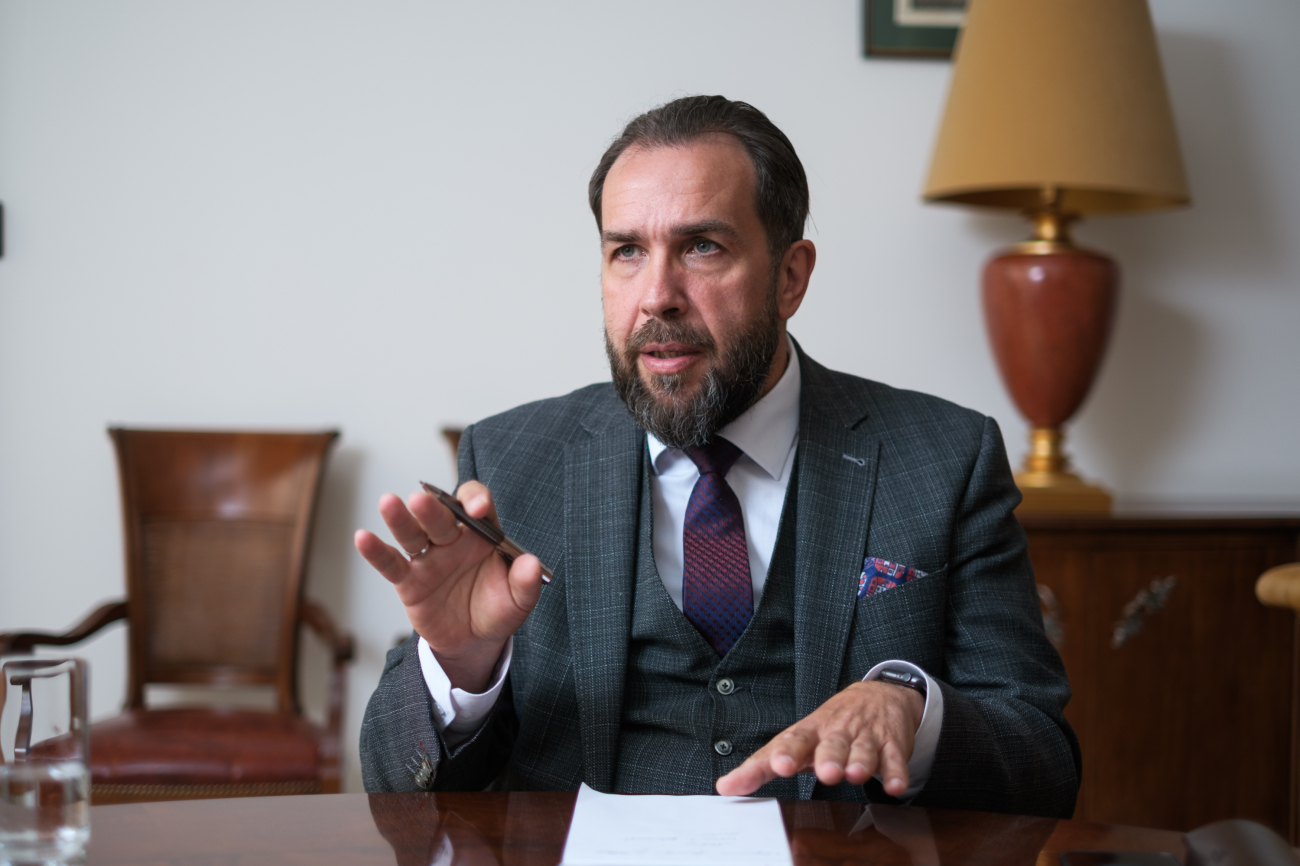 And again, victorious, free, democratic, sovereign, independent Ukraine is for us a way to achieve greater security, greater stability of the region, and Poland, of course, being the most interested party in it.
And again, victorious, free, democratic, sovereign, independent Ukraine is for us a way to achieve greater security, greater stability of the region, and Poland, of course, being the most interested party in it.
— So, definitely, you don't see Ukraine as a so-called buffer zone, as one of the leading presidential candidates said, do you?
— Buffer zone is a Russian term I'm rejecting, and I'm not going to use the Kremlin's narrative of buffer zones, a sphere of influence, and so on. So, the European Union is not a buffer zone. And again, we are supportive, we are committed, and we are fully behind Ukraine's back when it comes to joining, to being integrated into the enlarged European Union.
— And NATO?
— And NATO, yes, that's what I will tell you a little bit later.
We are speaking right now of the process that is currently being conducted as an active process of integration. So, there are no buffer zones in the European Union as the end goal of this accession process. Ukraine becomes a normal member state with all the privileges and obligations of the European Union. Which is not only a family of economic interests, of economic actors, but also actors that are connected, that share the same values, that share more or less the same democratic system, and Ukraine will be an equal member of this great historical alliance we call the European Union.
It's rather something that we want to keep as high as possible – a future position of Ukraine as being as close to NATO in the near future. This is our goal for Ukraine to also become a member of the second pillar of Western civilization, which is the European Union, plus NATO. And we are committed to supporting Ukraine on this path as well.
— Do you think that it is realistically possible to guarantee that Russian aggression against Ukraine will not happen again in the long term, given that the current Putin regime remains in place in the foreseeable future?
— Well, obviously, we are counting first on the dramatic or undramatic changes in Russia that would stop this brutal and unjust invasion. And second, what would happen in Russia depends on the Russians and how they want to diminish their role in the world in the future.
I strongly believe that Russia will eventually emerge from this conflict, from this historical period, as diminished rather than strengthened. And it's not only the goal, it's my desire, it's everything this war is about: that a country like Russia cannot threaten its neighbors, cannot maintain its position as aggressively as it was.
There have been 35 years of constant Russian wars against its neighbors, against its people, let's recall Chechnya and other places. This cannot continue like that. I'm not going to speculate about future wars. We have a one to win at the moment. And the future very much depends on the outcome of this, and how this invasion ends badly for Russia.
— I want to ask you about the military assistance to Ukraine from your country. Which categories of weapons may we expect in the foreseeable future?
— As you are aware, and many of our Ukrainian friends and colleagues are very well aware of, that Poland was the first to help in the most dramatic first days of the full-scale invasion. We were the first to help and the first to respond with all the capabilities and possibilities that were available, and that helped Ukraine to win the first glorious battles around Kyiv, later on around Kharkiv, and around Kherson. So, we made it possible with our assistance.
Nowadays, Polish capabilities are changing, and the nature of our assistance is changing. So, we are not talking anymore about tanks, but rather about the ammo, about the training of Ukrainian forces. Roughly speaking, it's almost 30,000 soldiers who were trained in the territory of Poland. I believe it's one of the biggest numbers among the allies.
So it's a material help, it's ammunition, it's all kinds of assistance. Just to mention the famous story of Starlink. Starlink routers, I believe half of them, so fantastically used by the Ukrainian Armed Forces, are sponsored by Poland; actually, the contract is on our side. So that's worth remembering that we are helping, maybe not with the heavy stuff, but with the badly needed capabilities that Ukraine requires so much.
So the military assistance continues. We delivered, I believe, already the 46th package worth something around 200 million euros. We are at the moment preparing another package, 47th, more or less of the same value.
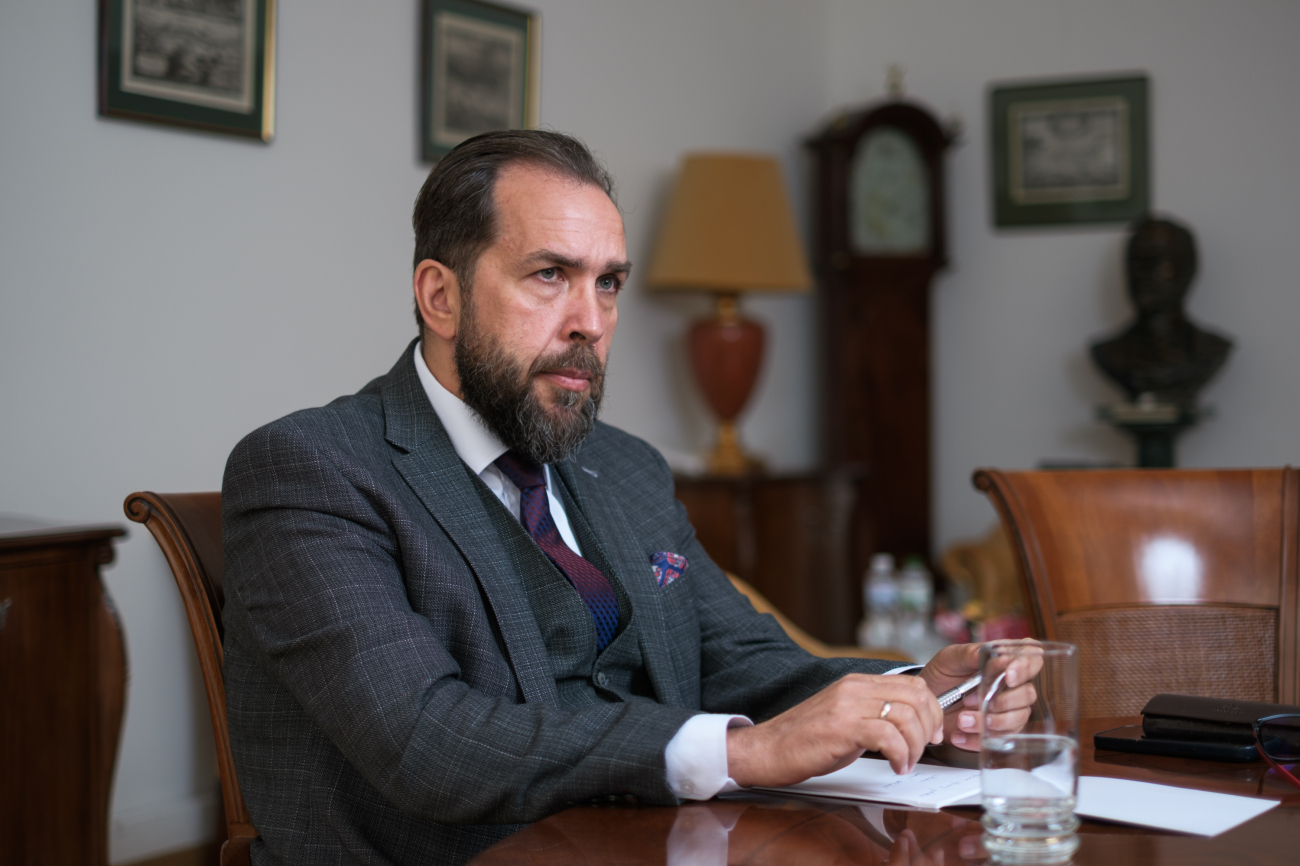 — Throughout the war, Ukraine has become one of the world leaders in the production of certain types of weaponry. Perhaps most of all are the drones of different types. In this context, how can the military cooperation between our two nations evolve in the future, after the end of the war? For example, is Poland ready to invest in creating some joint enterprises in the military production sphere?
— Throughout the war, Ukraine has become one of the world leaders in the production of certain types of weaponry. Perhaps most of all are the drones of different types. In this context, how can the military cooperation between our two nations evolve in the future, after the end of the war? For example, is Poland ready to invest in creating some joint enterprises in the military production sphere?
— The production is already ongoing, and the cooperation in production is already ongoing, and the nature of it is rather shrouded in secrecy, so I'm not going to talk about the details, but it is well known in the public sphere that Ukrainians and Poles are involved. There are numerous Polish producers, products of which are available and used very effectively by the Ukrainian Armed Forces flying over Ukraine, helping spot reconnaissance and defend against the Russian forces.
We are in the process of developing broader production. One of the achievements of the Polish presidency in the European Union was speeding up the adoption of the so-called Rearm Europe program, and SAVE program as well, which would be partly dedicated also to creating the possibility for the Ukrainian defense sector production to become closer to the European Union sector. This requires the transformation of the Ukrainian part, this requires transformation on the European part and also requires transformation on the Polish part, and I believe that we will see quite soon the results of this ever-closer cooperation.
— How is the risk of Russian aggression against NATO countries, in particular Poland, assessed these days, if we talk about several years to come? Do you prepare for it, and how?
— Short message to Kremlin: do not try! NATO is a stable, powerful, reasonable, and very dedicated alliance. Not one inch of the NATO territory will be subjected to a military invasion. And we are actively defending against non-military, so-called hybrid invasions, as we see, for instance, in the Polish eastern border with Belarus, where we are under constant pressure, created by the malign actions of Belarus and Russia.
Of course, we are observing all kinds of crazy actors on the global scene. That's not like we are predicting that the future is bright, but we are prepared. As you know, we are the leader when it comes to GDP percentage dedicated to military production, military purchases, and building the military sector in Poland. And also it's worth mentioning that Poland not only spends 4.7, almost 5%, but we are also a leader in spending on new equipment, so it's not only refurbishing and restoring the formerly acquired stuff, but we are modernizing our army. One true friend of Poland is the Polish Armed Forces.
And secondly, Poland is dedicated to defending the NATO territory of our immediate and further allies and member states. So, you should not speculate. What we can say with some level of being sure that the military future of Europe, the military future of European warfare, very much depends on the outcome of this war. Diminished, weakened, and defeated Russia means that the perspective of such a stupid decision, stupid thinking of having yet another war that would destroy Russia, very much depends on the outcome of this war. And again, I'm pretty sure that this war ends with a defeated Russia rather than a strengthened one. And that's maybe an answer to your question.
— The United States decided to withdraw its troops from Jasionka near Rzeszów, and there are a lot of speculations in the media regarding the overall reduction of US military presence in the region, particularly in Eastern Europe. So I have two questions in this regard. First, does this move from the US somehow harm the logistics of deliveries to Ukraine, since Rzeszów-Jasionka is a key hub? And secondly, more broadly, do such reports raise any concerns for you?
— You have used the word withdrawal, let me correct you. It's just a reshuffle of the US forces inside Poland, which are stationed in Poland. Jasionka is not the only US facility in Poland operated by Americans. There are way too many such places in Poland that exist, bigger or smaller, that are hosting US forces, and they are very much needed and desired by our US partners to be kept, to be maintained in Poland. So that wasn't a withdrawal, that was just a kind of shifting, moving the forces around the various facilities in Poland.
It was a decision of the NATO summit last year to replace the United States' leading role, bilateral role in providing logistical support for Ukraine, to take it over by NATO. And what we see right now is other member states taking responsibility, including Poles, Germans, and other, Canadians, taking the crucial role of commanding and defending Jasionka Airport, and the hub is well protected. This is NATO territory, it's not some cutout base, cutout territory of Poland. This is NATO territory, this is NATO's mission, and NATO's responsibility to defend this logistical hub, which is operating fully without delays, without problems.
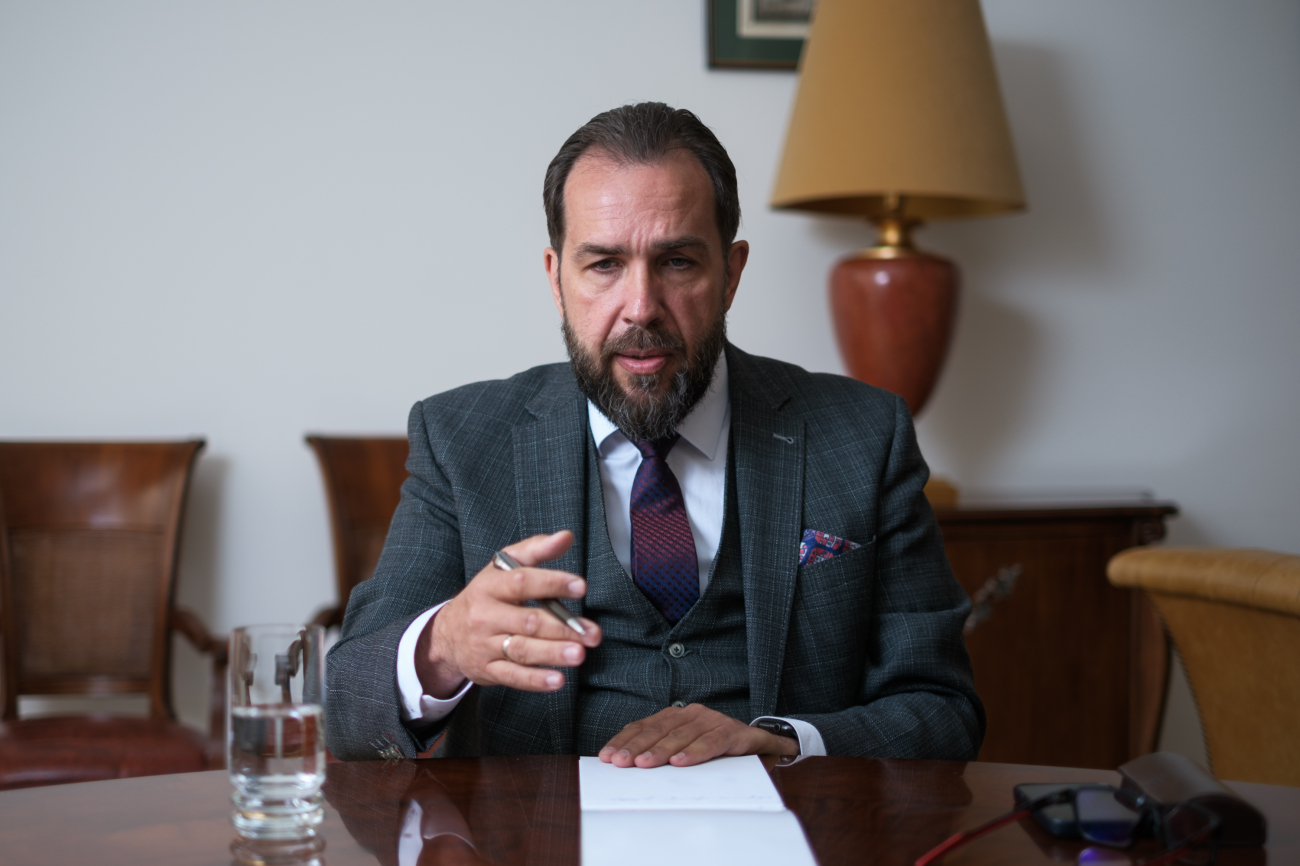 — I have a couple of questions regarding Ukraine's path to the European Union. The first one: Do you believe that a political obstacle, I mean one country that is always against everything, may be removed or circumvented soon so that the negotiations would go on as planned, the clusters will be opened, and so on?
— I have a couple of questions regarding Ukraine's path to the European Union. The first one: Do you believe that a political obstacle, I mean one country that is always against everything, may be removed or circumvented soon so that the negotiations would go on as planned, the clusters will be opened, and so on?
— The nature of these obstacles, which right now come mostly from Hungary, but in the past also came from other member states of the European Union – this is the nature of the European Union, that some important, and sometimes controversial decisions can come in the almost last possible moment. This is the nature of the Union.
It's based not on pushing member states around, but rather compromising, discussing, and negotiating, and it takes a lot of work from diplomats actually to create the pathways or ramps off for countries that are very strongly rejecting something, and then being not forced but rather convinced, for example in the adoption of sanctions. This is exactly the story of the 16th package of the sanctions that was adopted in January, at almost the last moment. It took a lot of effort, including Polish diplomats, to convince other member states to adopt.
We are still optimistic that the opening of the first cluster of the negotiations, meaning the fundamentals, will be adopted by the end of our presidency, end of June. All the member states that are even rejecting this possibility right now should be aware that it's just the opening of the cluster, it's not the negotiations themselves.
If someone is rejecting it right now, our answer is: to show us your diplomatic skills later on. This is just a technical decision to open the negotiations, to open the clusters. Then you can, if you are so skilled as a diplomat and negotiator, prove it.
— But at a later stage.
— Yes. My message to the blockers of Ukraine’s accession process: do not weaken Europe, the European Union, by your stubbornness. So that's how it is in the European Union, and this is what we are trying to achieve as a presidency. And again, I'm hopeful that there will be some last-minute change of mind and the story will continue as a successful one. Because European integration and the enlargement of the EU is the success story. We, Poland, are the foremost example of this success story.
— On this Ukrainian path to the EU, do you think that different trade or economic conflicts between Ukraine and Poland are inevitable? I mean the conflicts that have already led to different protests, and blockades of the border. Just several days ago, the Polish court banned another attempt of such a blockade.
— Please do remember that we've been there already. Especially in Poland. 20 years ago, our agriculture was shown by various member states that Polish farmers would come and destroy our agriculture.
20 years later, Polish agriculture is the European Union's agriculture with the standards, with the quotas, with all the benefits of being a member of the system. This would be a story of Ukrainian agriculture as well. It's a different type of agriculture. Ukraine is a breadbasket of the world, not only for Europe. It will not be a bread basket of the European Union, because we have our bread already.
But as far as I know, the objects or the desires of Ukrainian agriculture lie elsewhere rather than in creating great competition inside the Union. So it's a really interesting story of how emotions can spoil the process, but based on our history in the European Union, this will be again a success story. It needs a transformation of Ukrainian agriculture, adapting the standards and the ways of doing business inside the European Union. Of course, it's also maybe a question for the European agriculture system to transform, to be able to adapt to this, but it's all about competition, it's all about non-internal competition, but rather being competitive as an actor on the global market.
This is one of the main points of our presidency: we are not competing between ourselves, but we are competing as a block against other players on the market.
You mentioned the so-called blockade because it was an example of how the rule of law and legal decision-making can solve problems.
And the decision, of course, was actually to draw down this blockade. This is the right of the people to demonstrate their political, economic, and social interests. And of course, the Polish government is protecting the interests of our businesses, our agricultural sector, which is obvious. But again, this is being done as part of the system rather than being done against the system.
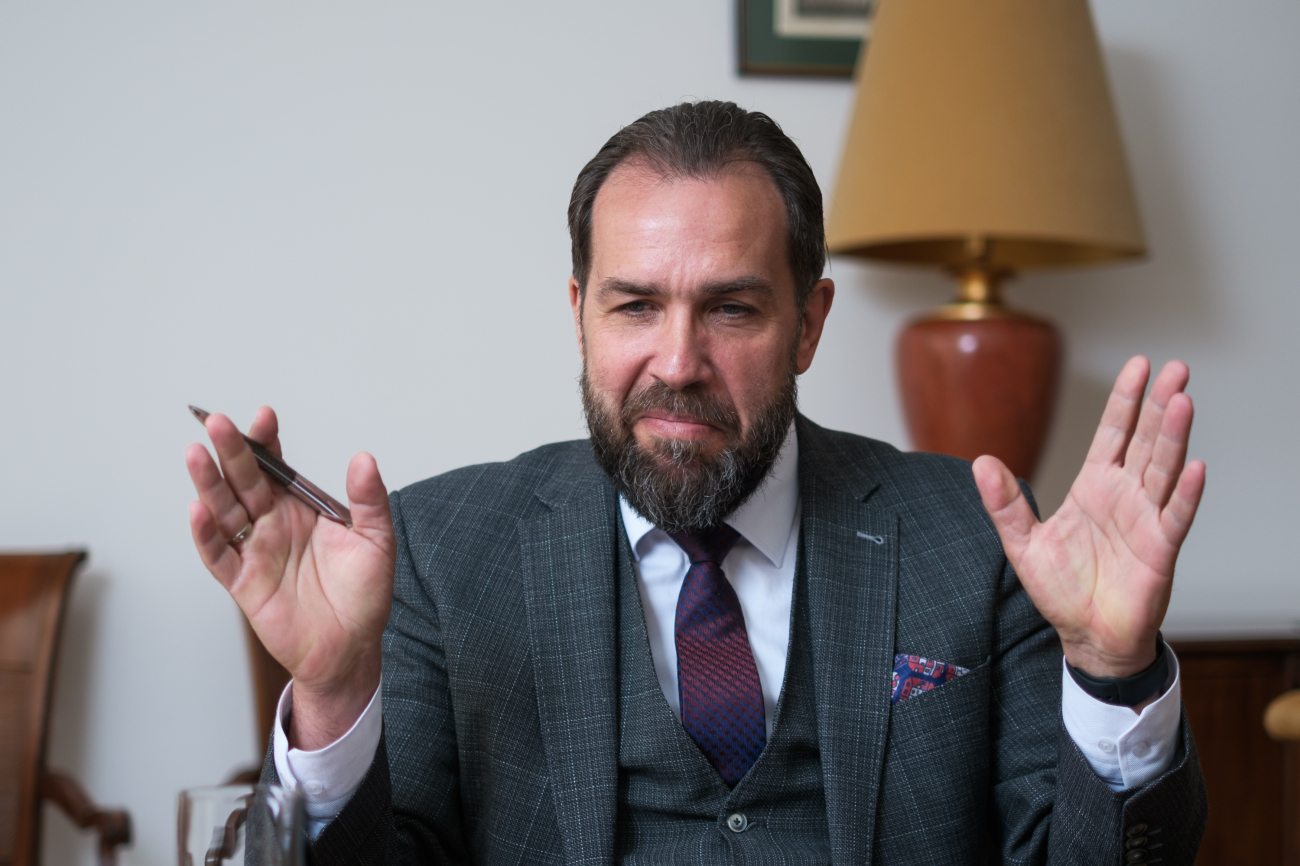 — Should we expect any changes in social support for Ukrainian refugees in Poland after the election? For example, Karol Nawrocki said that social benefits should be paid primarily to Poles, Rafał Trzaskowski suggested depriving non-working Ukrainians of certain social payments, and many other candidates shared more or less similar ideas.
— Should we expect any changes in social support for Ukrainian refugees in Poland after the election? For example, Karol Nawrocki said that social benefits should be paid primarily to Poles, Rafał Trzaskowski suggested depriving non-working Ukrainians of certain social payments, and many other candidates shared more or less similar ideas.
— Please judge us by our actions rather than by the announcements and predictions of the future. The Polish social system of social benefits is under constant transformation. We have our internal discussion of what to do with the so-called 800+, which is the famous program that supports families with kids. So, we are having this discussion on our own, and the transformation will be kind of natural to our interests.
Ukrainian refugees and Ukrainian residents are part of this system, and they will be subjected to the changes that are applied to everyone who is a part of the program.
There are some small tweaks, I can give you an exact example of what has been changed in the last two years when it comes to social benefits. So, we are talking about the small payments like 40 zł a month for the families who adopted refugees. It just needed to be strengthened, to be more transparent and more according to the regulation. So it's not that much, and people are just required to send their children to school as a basis for this payment. So, this is the discussion that is undergoing.
And again, it will continue, the discussion will continue, the system will change, but it will change according to the general requirement. The general structure might be changed, rather than it will address specific parts of Polish society, because, of course, it's worth mentioning that we are hosting more than a million Ukrainian refugees, who are our residents, our guests, our friends, our co-workers, part of our business environment. They are paying taxes, and they are subject to all the necessary changes.
— How do you see the future of all these refugees after the war, after the end of the hostilities? Would you prefer these people to come back home or remain in Poland and remain part of your economy?
— I sympathize with the position of the Ukrainian government that we are not the ones to force the people to choose their way of life: they want to stay, they want to come back if they have somewhere to come back. This is very important. Ukraine already has a phenomenon of internally displaced persons. It's 7 or 8 million people. It's a huge portion of the Ukrainian society that has moved from the East to the West, from the South to the North. All kinds of migration, internal migration, obviously, because of the security situation and the brutal attacks against civilians by Russia.
So we are not the ones to decide to force people out, to force people in, it will be their choice. We can maybe do some sociological assessments, but again, there is nothing harmful to these people and nothing unjust that could happen to them.
— In your opinion, why has the attitude towards Ukrainians, Ukrainian refugees in Poland, worsened during these 3+ years, and who should be blamed for this? The Ukrainians themselves, or maybe some Polish politicians who use the Ukrainian issue for their purposes?
— Not to appear as if I'm trying to avoid the question, but I'm in favor of conducting diplomacy not based on the public opinion polls, but based on the national interest of Poland. And again, moods are changing, and it is the task of the leaders to show people the benefits and the challenges of Ukrainians in Poland. And given the very good period of Ukrainian-Polish relations right now, I hope, I'm expecting that these so-called tensions, so-called shifting the public opinion, would be changing accordingly with the very good period of our diplomatic relations.
— Do you think that something in this regard may change after the elections, and more broadly, will anything change for Ukraine as a country after your elections?
— I'm not wandering around the corridors of the embassy thinking of the elections and their outcome. I'm here to maintain substantial, partnering and meaningful, and effective diplomatic relations. I'm happy to report that we are doing this diplomacy, and that bilaterally, we are having great diplomatic relations. We are solving issues rather than thinking of what will happen in the next month, two months, or a year. It very much depends on what we do right now.
We have Prime Minister Donald Tusk proving it last Saturday. Foreign Minister Radoslaw Sikorski proved it last Friday. Minister for European Union Adam Szłapka proved last Wednesday that these relations are on a scale that was not visible years back.
— No matter what the outcome is, will it go on?
— I don't know what the outcome there is. No one knows. It would be very easy to jump into speculation, 'who said what'. There are way too often forgotten phrases of national interest, which are something beyond the actual cycle of politics, the actual turn of power. The national interest of Poland is to support Ukraine because this means that we are supporting ourselves, our defense, our security, and the economic wealth of Polish citizens. So the national interest is something that should be mentioned more often, rather than asking about who said what, who accused whom.
Especially in the information environment we are living in, where it is so easy to distort the words that are spoken.
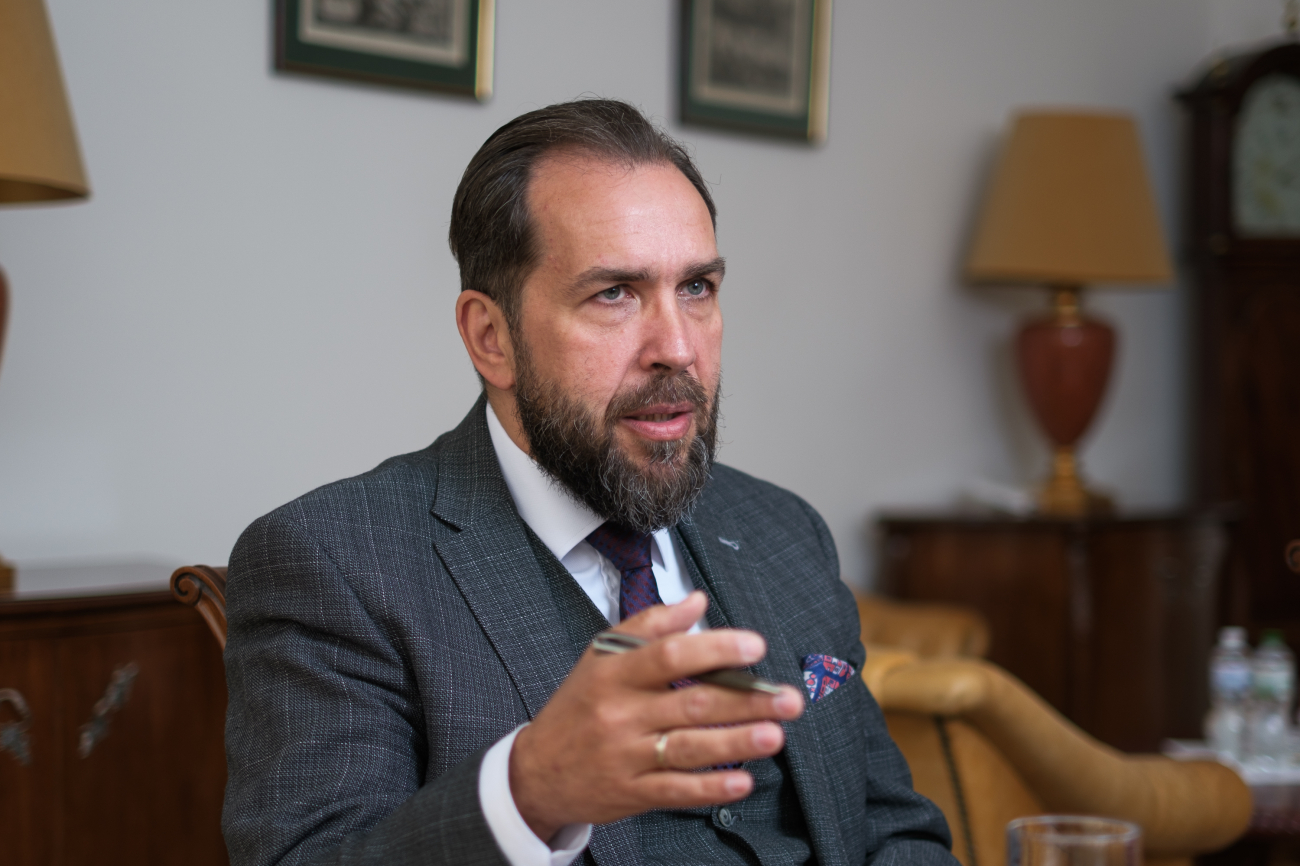 — The very last section – history and bilateral historical relations. Do you think that the recent start of the exhumation works in Galicia, in Puźniki, may be considered a sort of breakthrough in this area?
— The very last section – history and bilateral historical relations. Do you think that the recent start of the exhumation works in Galicia, in Puźniki, may be considered a sort of breakthrough in this area?
— Once again, let me very kindly correct you. It wasn't the start, the first process in Puźniki concluded that we started 8 months ago. When Minister Sikorski came here, met with Minister Andrii Sybiha, and they talked about this issue that was hurting our relations, I don't know, maybe for 6, for 8 years. They shared the view proposed by Minister Sikorski that let's not politicize it, let's not talk about remembrance or how to commemorate, but rather let's talk about how to allow families to find the remains of their close relatives and how to organize something that is a fundament of the European civilization, the right to be buried and to have a marked grave with a name, simple cross, where the relatives can come and pay their respects to their loved ones.
So with the adoption of this position, with the awareness of this position on both sides, we can talk about how to navigate the bureaucratic process on both sides, in Poland and Ukraine, how to organize the expeditions, because it's an archaeological expedition on both sides in Poland and Ukraine. And how to start the process that will take years.
And we started this because of the common understanding, because of the broader strategic realignment of this region, because of the invasion. So, when I talk about the fantastic period of the relations between Ukraine and Poland, a part of it is also the so-called historical discussion.
This is the bureaucratic process of allowing people to find the remains of their relatives and bury them. That's it. We have great solidarity, great sympathy from the religious figures here of all denominations in Ukraine, supporting this process. We have a commission working to facilitate the process. We don't haggle: we give you this, you give us that.
The good basis for this cooperation, discussion is always that one sentence that is always quoted in every meeting: when we, Poles and Ukrainians, are in an argument, Russia benefits.
We are under attack. Just a couple of days ago, our government found out that the arsons in Poland are being sponsored by the Russian special services. Europe is under attack by Russia. UK, Germany, Poland, Baltic States. We are under attack. Of course, Ukraine is under invasion, and so whatever might divide us is to the benefit of Russia. And with this realization, the common enemy is revealed, and our Polish-Ukrainian alliance is more desired.

